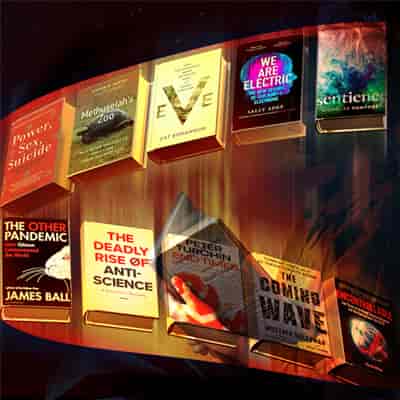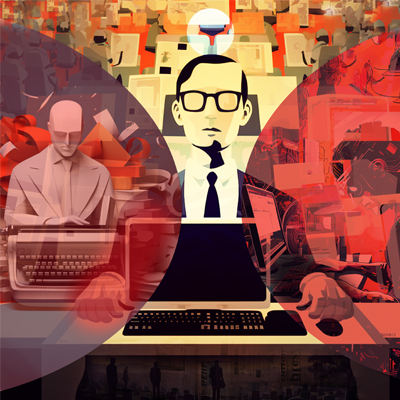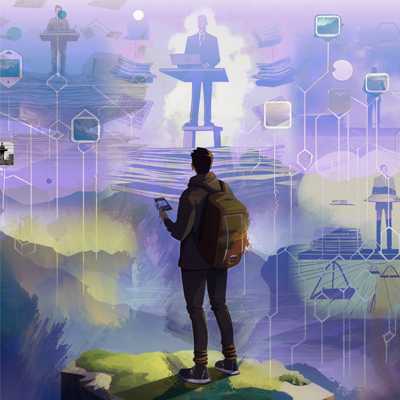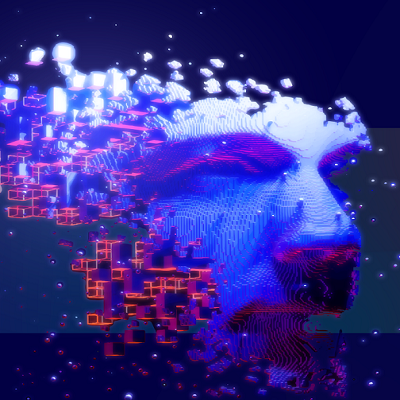Hollywood Writers Strike Versus Facsimile Culture
May. 18, 2023. 8 mins. read.
14 Interactions
R.U. Sirius explores the rise of AI in entertainment, the striking writers demanding regulations, and the battle to preserve human creativity. Discover the blurred lines between originals and facsimiles in art and music.
Since I first made fun of AI panic back in my second column, I’ve been growing more disturbed. But I never thought I’d join the Luddites. However, the striking writers of the entertainment industry are demanding to “Regulate use of material produced using artificial intelligence or similar technologies”. These writers are the first line of resistance against cultural productions being turned into facsimiles of creative brilliance. This has become a point of emphasis among the signs being carried on the picket lines, an indication of its populist appeal. It’s likely that the strike will actually make entertainment bigwigs more attracted to the possibility of ditching the humans for compliant chatbots with no demands and few needs. The fight against AI taking over TV writing is one that should be taken up ‘by viewers like you’ (as PBS likes to say). If you like complex TV shows and films with brilliant dialogue, it’s in your interests to keep the humans and not let the products of their minds be replaced by an AI-created facsimile.
In The Art World Facsimiles Have Become A Field Of Play in Which Toying with Financial Valuation Serves as a Sort Of Content
In the art world, the distinction between the real thing and a copy of the real thing has been obscured for many years, with a wide variety of consequences. In visual arts, copying became a field of play. The philosopher Walter Benjamin set the terms of the discourse in 1935 with his essay ‘The Work of Art in the Age of Mechanical Reproduction’. Benjamin was dealing with physical objects, and he theorized that an original artwork carried an ‘aura’ that gave it a high capital valuation. In the age of increased reproducibility, Benjamin conjectured that the value or the original would diminish. This hasn’t happened, as originals both old and new fetch huge prices. At least since the Pop Art movement of the 1960s, the art world has toyed with this trope — this predicted tug-of-war between the original and the facsimile, by just saying yes; delivering both originals and multiples. Warhol started mass distributing postcards of his most widely-recognized works in the early 1960s, while the original maintained its ‘aura’ and could be sold to collectors (although it took the pale man’s actual demise for the aura to glow enough to attract really spectacular sums.)
An odd twist comes into play in the land of NFTs. The work is infinitely replicable and can be distributed in moments to billions of internet users, and the NFT-collector may or may not be purchasing exclusive access. What the collector seems to be after is not the aura of the artwork, but the aura of ownership in and of itself – or of a particular relationship to the work.
The Mass Distribution of the Facsimile of Recorded Music
In the world of recorded music, Neil Young stood out as the loudest early curmudgeon complaining that digitally-created CDs and later music files offer a pallid facsimile of what a recording artist intends. (Of course, it could be argued that recorded music itself is a facsimile of the way music was experienced for millenia prior to its invention, but I’m not going to try to unpack that here. In 1931, The American Federation of Musicians denounced recorded music as, basically, a facsimile of live music that would debase the art.) Over the years, Young’s complaint has become a generally accepted wisdom. We trade quality for the facsimile that is easily distributed and conveniently available.
My friend ChatGPT agrees: “Digital audio compression works by removing parts of the audio signal that are perceived as less important or less noticeable, in order to reduce the file size and make it more convenient for storage and distribution. However, this process can also result in the loss of subtle nuances and details that contribute to the overall richness and depth of the sound.
“Studies have shown that digital audio compression can result in a loss of dynamic range, which is the difference between the loudest and softest parts of a recording. This can make the music sound less dynamic and less engaging, particularly in genres such as classical music that rely on subtle changes in volume and tone.”
Will the ironies never cease?
Is All Cultural Production A Facsimile of Life?
Taking a sharply anarchic left turn in this exploration, we might take up the view of the European radicals of the 1960s, the Situationists, who viewed all cultural production as contributing to the ‘society of the spectacle’. In his book, ‘Society of the Spectacle’, Guy Debord wrote, “The spectacle is a social relation between people that is mediated by an accumulation of images that serve to alienate us from a genuinely lived life. The image is thus an historical mutation of the form of commodity fetishism.” In other words, all art (from the word artifice or artificial) alienates us from direct experience. Among the practices used by the Situationists, the one most familiar to us today would probably be actions that contemporary people would call pranks. These were actions designed to break the trances citizens going through their normal routines. The Situationists called this tactic ‘construction’, and it involved created situations that would disrupt the status quo and encourage spontaneous excitement, joy or, for that matter, anxiety.
Situationism pretty much abandons mediation completely for intensely lived daily lives, what Situationist Raoul Vaneigem called ‘the revolution of everyday life’.
An eruption of this sort of consciousness would pretty much put the striking writers out to pasture. But this is not our world today.

Remember When Youtube Was Going To Wipe Out Professional Television Production?
Aside from AI creativity — or possibly in combination with it — another specter looming up to challenge TV writers is the democratization of video production. This was, first of all, the dream of avant-gardists like Nam June Paik: that everyone could be a video artist. That it would become a medium of creative self-expression and break up the confining linearity of storytelling. And, back in the earlier years of this century, Wired magazine related pundits like Kevin Kelly and Chris Anderson predicted that the “long tail” of small scale content creators (video in particular) would create niche audiences that would seriously impact and begin to replace the big movie and television productions. This doesn’t appear to have happened, although it could be that TikTok is grabbing them while they’re young and a generation will emerge that prefer 30-second clips of someone having their cat speak in a funny voice to the complex plots and dialogues of shows like ‘Succession’ or ‘Atlanta’.
Maybe Our Lives Are A Facsimile
Finally we come to Simulation Theory, that favorite 21st century cosmology that our very lives themselves may be, in a sense, a facsimile, a mediated creation… a computer simulation. In this case, we may as well carry on by emphasizing that which gives us pleasure – at least until we find a way to bust out of The Matrix without switching off our facsimile universe. Like Pinnochio and Zuckerberg, we all long to be real boys (or others).
What Is To Be Done?
I’ve seen mixed results from attempts to get Chatbots to achieve authentic creative madness. So I think we should place our bets on a proven winner. That would be the screenwriters who have managed to send some wonders to our screens in this century, from the aforementioned ‘Succession’ and ‘Atlanta’ to ‘Fleabag’, ‘Black Mirror’, ‘Mad Men’, ‘Fargo’… the list of well-written shows goes on. (I won’t mention the unfunny comedy writing of ‘SNL’ or ‘The Daily Show’. Nope. Won’t mention it.)
I mean, assuming there won’t be a revolution in everyday life in which we achieve some kind of unmediated intensely experienced existence, I suggest we try to keep these writer-freaks employed, well-paid and supplying us with cool content. (Why do I imagine that a Situationist revolution of unmediated intensely experienced existence could end up being as exhausting as having to work all the time? It’s a bit like being asked to constantly engage in leisure activity as a participant when sometimes you just want to kick back and watch a good TV show. Sometimes we choose slack over engagement.) Speaking of which, after completing the first draft of this piece, it was announced that Facebook’s ‘Metaverse’ had failed and was being shut down. It’s unclear whether the failed attempt to bring VR to Facebooks 3 billion users represents a rejection of VR as a participatory medium that some, as far back as the early 1990s, thought would replace TV, or if the technology is still too raw for people to want to climb in, or whether Facebook’s particular attempt was somehow flawed.
In any case, we should support our striking writers lest the profiteers of television decide that they could fill the air with cheap reality programming, some of it possibly featuring dumb AIs and even dumber humans engaged in banal contests, and that they don’t need any pesky humans, even if the award-winning smart shows disappear. After all, reality TV gets a big viewership and is extremely profitable. I fear this may be the ultimate result of the great battle of the Hollywood writers against the entertainment machines.
Let us know your thoughts! Sign up for a Mindplex account now, join our Telegram, or follow us on Twitter.

.png)

.png)


.png)










7 Comments
7 thoughts on “Hollywood Writers Strike Versus Facsimile Culture”
🟨 😴 😡 ❌ 🤮 💩
🟨 😴 😡 ❌ 🤮 💩
🟨 😴 😡 ❌ 🤮 💩
🟨 😴 😡 ❌ 🤮 💩
🟨 😴 😡 ❌ 🤮 💩
🟨 😴 😡 ❌ 🤮 💩